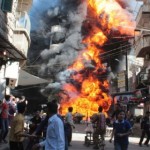The world is in the midst of growing geo-economic instability that is generating widespread global political turbulence. Even as the weight of economic activity continues to shift from West to East, the institutions of global governance remain firmly in the hands of the West. Gateway House argues that this is rendering these institutions incapable of addressing the many issues crying out for mitigation. The past year has already seen a number of upheavals flowing out of the steep fall in the price of oil, the turbulence in West Asia, the western rapprochement with Iran and the atrocities committed by the Islamic State (ISIS). All this amidst the relative slowdown of the Chinese economy as its government tries to steer away from an export-led economy, depressing global commodity prices.
Over the next couple of months, Gateway House experts will attempt to deconstruct these events and how India and its foreign policy can work to take advantage of these trends.
The butterfly effect of these events is visible with each event triggering a chain reaction. The fall in the price of oil has devastated the budgets of Saudi Arabia, Russia and Nigeria even while it has served as a boon for major oil-importing countries like India, seeking to control its fiscal deficit. Lower oil revenues are aggravating the weakened state structures in West Asia and North Africa already buffeted by the suppression of the Arab uprisings and NATO military interventions in countries ranging from Afghanistan to Iraq to Libya. These interventions have over the years promoted the emergence of terrorist organisations such as Al-Qaeda and now more brutal – ISIS.
Just like the precipitous fall in the price of oil, the conclusion of the P5 plus 1 agreement with Iran over the latter’s nuclear programme has rearranged strategic alignments in the region. Israel and Saudi Arabia have moved closer in their shared hostility towards Iran. Proxy wars are playing out between a Saudi-led Sunni coalition of Gulf Arabs and Iran-led Shia forces in Yemen and Syria. Even as the U.S.-led NATO countries support the Saudi-led Sunni coalition in Syria, Russia has reinserted itself militarily on the side of Iran and Syrian President Bashar al-Assad. This even as the Russian economy reels under falling oil prices and sanctions imposed by the U.S. and Europe over the conflict in Ukraine.
The civil war in Syria has become the epicentre of the turbulence in West Asia and tremors are flowing out of it have been felt as far as Europe, South East Asia, Nigeria and Pakistan. The long reach of ISIS has been on display in terrorist attacks across the globe, from direct daring attacks in Paris and Beirut to affiliate or inspired groups claiming responsibility for attacks in Nigeria and Jakarta to even the killing of foreign aid workers in Bangladesh.
The crisis in Syria has had the further ripple effect, whereby the European Union–already stressed by the Euro crisis–is convulsed by the inflow of up to a million desperate refugees from Syria, Libya and Afghanistan – all countries which have been victims of NATO bombings either now or in the recent past.
Adding to the widespread sense of vulnerability is the preoccupation of the U.S. with its forthcoming Presidential elections, spewing as much, if not more, xenophobia in the campaign rhetoric of the candidates for the Republican nomination, as the refugee crisis has aroused from increasingly popular extreme right-wing parties in Europe.
Global economic uncertainty is also being exacerbated by the moderation of growth in China. The effort of the Chinese government to transition from a high savings and export-led model to a more domestic consumption and services oriented economy is having a contagion effect on commodity and energy exporting countries, as well as stock exchanges around the world. As China emerged as the hub of manufacturing, it also became the engine of global growth spurring enormous demand for raw materials and commodities. Therefore, the impact of the Chinese economy’s slowdown is seen in the slowdown of the ASEAN economies which were plugged into production processes centred in China.
The level of uncertainty in the world is so high that, Western analysts speculate that these disparate conflagrations portend a third World War. However, we no longer live in a world where the West is in a position to force its colonies into their war, but in a multi-polar world where countries, like India, can forge their own destinies.
Neelam Deo is Co-founder and Director, Gateway House: Indian Council on Global Relations; She has been the Indian Ambassador to Denmark and Ivory Coast; and former Consul General in New York.
This article was exclusively written for Gateway House: Indian Council on Global Relations. You can read more exclusive content here.
For interview requests with the author, or for permission to republish, please contact outreach@gatewayhouse.in.
© Copyright 2016 Gateway House: Indian Council on Global Relations. All rights reserved. Any unauthorized copying or reproduction is strictly prohibited


